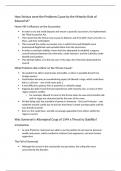How Serious were the Problems Cause by the Minority Rule of
Edward VI?
Henry VIII’s Influence on the Succession
In order to try and avoid disputes and ensure a peaceful succession, he implemented
the Third Succession Act.
This meant that the throne was to pass to Edward, and if he didn’t have any heirs, to
Mary, and then to Elizabeth.
This reversed the earlier succession acts, in which Mary and Elizabeth were
pronounced illegitimate and excluded them from the succession.
In order to maintain stability, Henry had also attempted to establish a regency
council balanced between the reformists, under Seymour, and the Catholics under
Norfolk and Gardiner.
This attempt failed, as in the last year of his reign, the reformists dominated the
council.
What Problems did a Minor on the Throne Cause?
He wouldn’t be able to lead troops into battle, so there is possible threat from
foreign powers.
Factionalism became an overwhelming aspect of Edward’s reign, which could have
led to a civil war – war of the roses part 2.
It was difficult to portray him as powerful or militarily adept.
England also didn’t have the best experiences with minority rule, as many of their
reigns ended in conflict.
o For example, Edward VI came to the throne when he was only 8 months old,
and his reign was characterised by the wars of the roses.
All that being said, the transition of power to Somerset – the Lord Protector – was
relatively smooth, partly due to the fact that Henry’s death was kept quiet until he
was already in power.
Even so, this could have, and did, encourage opposition from others within the
regency council.
Was Somerset’s Attempted Coup of 1549 a Threat to Stability?
Introduction
As Lord Protector, Somerset was able to use his position to increase his personal
wealth and power, which resulted in criticism from opponents, and even former
supporters.
The Fall of Somerset
Although the unrest in the countryside was put down, the ruling elite were
concerned by the disorder.
, However, the personal style of Somerset’s government also caused resentment, and
led to the formation of an anti-Somerset faction.
This group had very little in common with one another except for the fact that they
hated Somerset.
o Thomas Wriothesley was opposed to the religious changed Somerset had
brought in.
o Warwick was looking for the chance to advance his power.
o William Paget didn’t agree with much that Somerset was doing.
Even though support for Somerset had been declining, it was the events of 1549 that
provided them with the opportunity to act.
What Happened?
In October, councillors marched armed through the streets of London, and
assembled at the house of the Earl of Warwick.
Somerset fled to Hampton Court, and then Windsor Castle with Edward, who
became ill and left.
He then claimed that his uncle, Somerset, had held him prisoner, and had
threatened riots in the streets if he was removed from power.
Unable to contradict the king, Somerset was removed from power by the other
councillors, and was arrested a week later.
The Aftermath
The removal of Somerset didn’t necessarily mean Warwick’s triumph or end the
struggle for power.
The council contained a majority of religious conservatives who didn’t trust Warwick.
As such, he brought in his own allies and removed Catholics from the council, so that
he had a protestant majority.
By January 1550, the leading catholic members of the council had been dismissed,
and Warwick had been made Lord President of the council.
However, these decisions had forced him to side with more religiously radical
members, and this would impact religious developments.
How Seriously did the Attempt to Alter the Succession in 1553
threaten Dynastic Security?
Edward’s Succession and the Devise
In the early months of 1553, Edward’s health began to deteriorate rapidly, and he
drew up his will.
According to both Henry’s succession acts and will, the throne was to pass to
Edward’s half-sister, Mary.
However, plans were put in place to change that.




